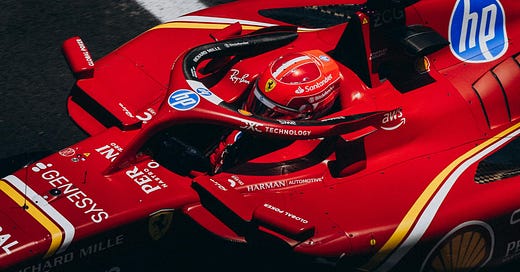F1's New Sponsorship Era: Luxury, Tech & Unexpected Deals Reshape The Grid
Formula 1’s latest sponsorship wave sees luxury brands, tech giants, and unexpected names securing major deals, what does this mean for the sport’s commercial future?
Luxury brands are deepening their involvement in Formula 1, reinforcing its premium status. LVMH Group, which includes Louis Vuitton, TAG Heuer, and Moët Hennessy, has signed a landmark deal reportedly worth $150 million annually. This agreement not only enhances F1’s prestige but also strengthens its positioning among high-net-worth audiences. Expect to see more high-end activations and luxury-driven marketing strategies throughout the paddock as the sport further embraces exclusivity.
Financial and technology partnerships continue to shape F1’s sponsorship ecosystem. Lottery operator Allwyn has joined as an official F1 partner while extending its collaboration with McLaren. Santander, now F1’s official retail banking partner, has also aligned with Williams Racing to promote Openbank in the US. Meanwhile, Atlassian has become Williams’ title partner in what the team calls its biggest partnership ever, highlighting F1’s growing appeal to enterprise tech brands eager to tap into the motorsport market.
Crypto remains an active player despite market fluctuations. Red Bull Racing has partnered with crypto-exchange Gate.io, replacing Bybit as its sponsor. Meanwhile, Ferrari’s new deal with HP marks another major tech-driven sponsorship, positioning them as a direct rival to Red Bull’s Oracle-backed technology partnership. This battle extends beyond the track, reflecting F1’s increasing reliance on cutting-edge digital solutions and strategic technology alignments to drive innovation both on and off the grid.
Unexpected brands are also entering the F1 sponsorship scene. Nestlé’s KitKat has become the official chocolate bar of F1, with a rollout planned for 2025 and expand globally in 2026. This partnership highlights how non-traditional sponsors recognise F1’s value as a marketing platform. Similarly, Lego and Mattel have secured licensing deals designed to engage younger fans, ensuring the sport’s long-term relevance to new audiences and reinforcing its status as a global entertainment property beyond just racing.
Sustainability remains a key focus, with Aggreko providing low-carbon energy solutions for European Grands Prix. As F1 accelerates its sustainability agenda, brands investing in green technology and carbon-neutral initiatives will gain greater visibility. Companies that align with the sport’s eco-friendly shift are set to benefit from its push towards a more sustainable future, as F1 continues to promote innovations that reduce its environmental footprint and attract brands committed to responsible business practices.
Formula 1’s commercial landscape is evolving with unexpected partnerships that reflect the sport’s vast global influence. As more companies seek to capitalise on F1’s blend of prestige and mass appeal, sponsorship deals will become even more ambitious. With brands across finance, technology, and lifestyle sectors vying for visibility, F1’s commercial ecosystem promises dynamic growth, stronger fan engagement, and an ever-expanding network of corporate alliances that will shape the sport’s future direction.





